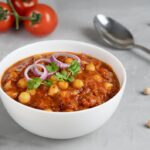Ulcerative colitis (UC) is a chronic inflammatory bowel disease that affects the colon and rectum, causing painful symptoms like diarrhea, abdominal pain, and rectal bleeding. Managing UC involves not only medication but also a carefully tailored diet. Eating the right foods can help reduce flare-ups and improve overall digestive health. Here are 20 foods that South Africans suffering from ulcerative colitis should consider adding to their diet.
1. Bananas
Bananas are soft, easy to digest, and packed with potassium and fiber. They help replace lost nutrients during flare-ups and can soothe the digestive system, making them a great snack for those with UC.
2. Oats
Oats are a gentle, soluble fiber that promotes bowel regularity without irritating the gut. They’re ideal for breakfast, especially during periods of remission when fiber intake needs to be increased.
3. Applesauce
Applesauce is easy to digest and provides a good source of vitamins, including vitamin C. It’s better to choose unsweetened varieties to avoid added sugars, which can exacerbate symptoms.
4. White Rice
White rice is a bland, low-fiber food that’s gentle on the digestive tract. It’s easily digestible and can provide the energy needed without aggravating UC symptoms during a flare-up.
5. Bone Broth
Bone broth is rich in collagen and amino acids that can support gut health and reduce inflammation. It’s hydrating and nourishing, making it ideal during flare-ups when nutrient absorption is poor.
6. Salmon
Salmon is high in omega-3 fatty acids, which have anti-inflammatory properties. These healthy fats can help reduce inflammation in the colon, making it a beneficial food for those with UC.
7. Chicken Breast (Skinless)
Lean proteins like skinless chicken breast are easy on the stomach and provide the necessary protein for healing and muscle repair. This protein source is less likely to trigger UC symptoms.
8. Avocados
Avocados are rich in healthy fats, fiber, and potassium. They are easy to digest and provide much-needed nutrients for those with UC. They can also help prevent weight loss during a flare.
9. Smooth Peanut Butter
Smooth peanut butter offers a source of healthy fats and protein, without irritating the intestines. Avoid chunky varieties, as the added texture can be harder to digest.
10. Pumpkin
Pumpkin is a soothing, nutrient-dense vegetable that’s easy to digest. It’s packed with vitamins A and C and provides a good source of fiber that doesn’t usually irritate the colon.
11. Carrots (Cooked)
Cooked carrots are an excellent source of beta-carotene, which supports immune health. Cooking them softens the fiber, making them easier to digest for those with UC.
12. Zucchini (Cooked)
Cooked zucchini is another easy-to-digest vegetable that’s low in fiber. It provides essential vitamins without causing irritation in the gut, especially when consumed without the skin.
13. Coconut Water
Coconut water is an excellent hydration source for those with UC, especially during flare-ups when electrolytes are depleted due to diarrhea. It’s rich in potassium and other electrolytes that promote recovery.
14. Plain Greek Yogurt
Plain Greek yogurt contains probiotics, which can help restore healthy gut bacteria balance. It also provides a good source of protein, but it’s important to choose low-sugar varieties to avoid irritation.
15. Papaya
Papaya is known for its digestive enzymes that aid digestion and soothe the stomach. It’s soft, easy to digest, and provides essential vitamins like vitamin C and folate.
16. White Potatoes (Peeled)
White potatoes without the skin are gentle on the digestive system and can provide a good source of carbohydrates and energy. They are bland enough to not trigger UC symptoms during a flare-up.
17. Eggs
Eggs are a fantastic source of easily digestible protein and essential vitamins like B12 and vitamin D. They can be eaten scrambled, boiled, or poached and are unlikely to trigger UC symptoms.
18. Cucumber (Peeled)
Peeled cucumbers are hydrating and easy on the digestive system. They provide a good source of water and vitamins, making them a refreshing option for those with UC.
19. Refined Pasta
During UC flare-ups, high-fiber foods can be difficult to digest. Refined pasta is low in fiber and provides an easy-to-digest source of carbohydrates for maintaining energy levels without irritating the gut.
20. Tilapia
Tilapia is a mild, white fish that’s easy to digest and low in fat. It’s a good source of lean protein, which is important for maintaining muscle and tissue health during and after flare-ups.
For South Africans living with ulcerative colitis, managing food intake is crucial to keeping symptoms under control. Focus on low-fiber, easy-to-digest foods during flare-ups, and incorporate anti-inflammatory options like salmon and avocados to support long-term gut health. Always consult a healthcare provider or nutritionist for personalized advice, especially if you are experiencing severe symptoms or flare-ups.








